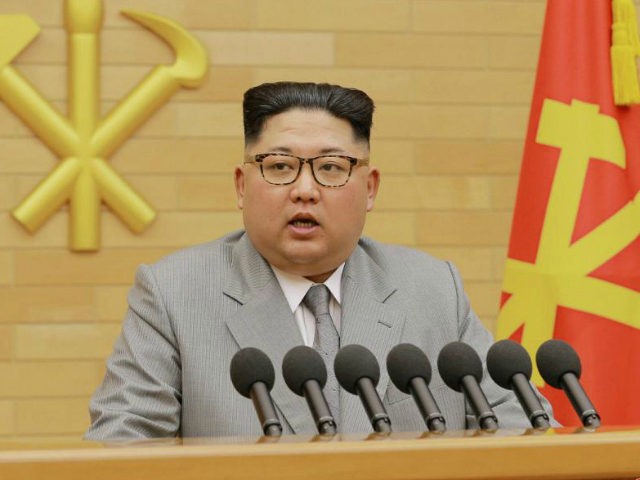Signals from North Korea remain as difficult to read as ever.
Wednesday brought news that dictator Kim Jong-un has ordered the reactivation of a hotline to South Korea that has been dormant for nearly two years, but also that he has ordered the construction of North Korea’s largest missile ever, with an eye towards launching it on the 70th anniversary of the communist regime in September.
The hotline was reactivated by an order from Kim, publicized with an announcement in state-run media, and then employed for two phone calls to South Korea. The first one lasted about 20 minutes and seems to have involved mostly technical exchanges to ensure the system was working. North Korea called for the second time about two hours later and said “let’s call it a day today,” as the South Korean Unification Ministry put it.
North Korea disabled the hotline in December 2015, after the North carried out a provocative nuclear test and the South responded by shutting down the joint industrial complex at Kaesong. South Korea urged the North to reconnect the line on Tuesday to help arrange an Olympic planning meeting, which the South would like to hold early next week.
The New York Times adds the bizarre detail that South Korea has been making daily calls on the disconnected hotline for the past two years, keeping the line warm and hoping that someone in the North would pick up. Since they never did, the South Koreans send important communications northward by either holding televised press conferences or shouting their messages across the border with megaphones. Both of these approaches would seem inappropriate for planning the Olympic Games.
A spokesman for South Korean President Moon Jae-in welcomed the reconnection of the border hotline, saying it “signals a move toward an environment where communication will be possible at all times.” The government of the province where the Olympic city of Pyeongchang is located offered on Wednesday to send a cruise ship to bring the North Korean delegation to the Games if they decide to attend.
The BBC finds it significant that the announcement of its reactivation was made not by a newscaster, but by Ri Son-gwon, chairman of the Committee for the Peaceful Reunification of the Fatherland—essentially North Korea’s version of the Unification Ministry. Ri made it clear that authorization to reconnect the phone line came directly from Kim Jong-un.
Also potentially significant is that this particular phone line, one of 33 known to exist between North and South Korea, is located in Panmunjom, the border town where talks on the Winter Olympics offered by South Korea on Tuesday would take place. Kim used his New Year’s Day address to signal a willingness to work on participating in the Olympics.
If this is a true diplomatic opening from North Korea, it is guarded at best. The New York Times notes that in addition to peppering his conciliatory New Year’s address with the usual nuclear threats—one of which U.S. President Donald Trump famously mocked on Tuesday evening—Kim included his standard demands for South Korea to end joint military exercises with the United States and stop participating in the international sanctions effort led by the U.S.
Furthermore, Japanese media reported on Tuesday that Kim has given orders for the construction of the largest missile yet, with an eye toward launching it during the 70th-anniversary celebration of the communist state in September.
The new missile is described by the UK Daily Mail as an “upgraded version of Unha-3, a three-stage rocket last launched by North Korea in February 2016 which the regime claimed was a satellite carrier.” Despite these claims, the Unha-3 launch was widely seen as a disguised ballistic missile test.
A North Korean defector said to be involved in the missile program stated that the new vehicle was ordered during a two-day meeting of military and scientific personnel in December. Soon afterwards, North Korea’s Rodong Sinmun newspaper published an editorial defending satellite launches as “a legitimate exercise of the right that thoroughly fits the U.N. Charter that enshrines the basic rights of respect for sovereignty and equality, and the international laws that govern the peaceful use of space.”
The United Nations, however, condemned the purported satellite launch as a “dangerous and serious” violation of international restrictions and a “clear threat to international peace and stability.”

COMMENTS
Please let us know if you're having issues with commenting.